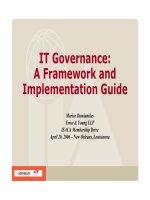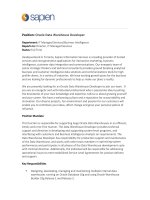Tài liệu What Is Administrative Distance? pdf
Bạn đang xem bản rút gọn của tài liệu. Xem và tải ngay bản đầy đủ của tài liệu tại đây (21.46 KB, 3 trang )
Cisco - What Is Administrative Distance?
What Is Administrative Distance?
Introduction
Most routing protocols have metric structures and algorithms that are not compatible with other
protocols. In a network where multiple routing protocols are present, the exchange of route information
and the capability to select the best path across the multiple protocols are critical.
Administrative distance is the feature used by routers to select the best path when there are two or more
different routes to the same destination from two different routing protocols. Administrative distance
defines the reliability of a routing protocol. Each routing protocol is prioritized in order of most to least
reliable (believable) using an administrative distance value.
Selecting the Best Path
Administrative distance is the first criterion that a router uses to determine which routing protocol to use
if two protocols provide route information for the same destination. Keep in mind that administrative
distance has only local significance, that is, it is not advertised in routing updates.
Note: The smaller the administrative distance value, the more reliable the protocol. For example, if a
router receives a route to a certain network from both Open Shortest Path First (OSPF) (default
administrative distance - 110) and Interior Gateway Routing Protocol (IGRP) (default administrative
distance - 100), the router will choose IGRP because it is more reliable. This means the IGRP version of
the route would be added to the routing table.
If you lose the source of the IGRP-derived information (for example, because of a power shutdown), the
software uses the OSPF-derived information until the IGRP-derived information reappears.
The table below lists the administrative distance default values of the protocols that Cisco supports.
Route Source Default Distance Values
Connected interface 0
(1 of 3) [5/6/2001 3:53:38 PM]
Cisco - What Is Administrative Distance?
Static route 1
Enhanced Interior Gateway Routing Protocol (EIGRP) summary route 5
External Border Gateway Protocol (BGP) 20
Internal EIGRP 90
IGRP 100
OSPF 110
Intermediate System-to-Intermediate System (IS-IS) 115
Routing Information Protocol (RIP) 120
Exterior Gateway Protocol (EGP) 140
External EIGRP 170
Internal BGP 200
Unknown 255
When using route redistribution, occasionally there may be a need to modify the administrative distance
of a protocol so that it takes precedence. For example, if you want the router to select RIP-learned routes
(default value 120) rather than IGRP-learned routes (default value 100) to the same destination, then you
must increase the administrative distance for IGRP to 120+.
There are no general guidelines for assigning administrative distances because each network has its own
requirements. You must determine a reasonable matrix of administrative distances for the network as a
whole.
Related Information
● Configuring IP Routing Protocols
● Route Selection in Cisco Routers
● IP Routing Protocols
● IP Technical Tips
Cisco Systems TAC Certified
(2 of 3) [5/6/2001 3:53:38 PM]
Cisco - What Is Administrative Distance?
Learn more about Cisco TAC Certification
All contents are Copyright © 1992 2001 Cisco Systems Inc. All rights reserved. Important Notices and Privacy
Statement.
(3 of 3) [5/6/2001 3:53:38 PM]









